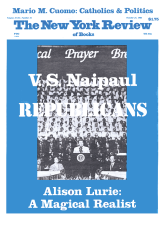In response to:
Nuclear Fantasies from the June 14, 1984 issue
To the Editors:
Lord Zuckerman’s review of (among others) Freeman Dyson’s Weapons and Hope [NYR, June 14] fails to do justice to the ideas expressed in that book, and gives the impression that it is fantastical and romantic, with little of substance. The book is in fact anecdotal in style (which I found to be appropriate, since some of our problems in dealing with the changing concepts of war in the nuclear age are similar to the problems people had in dealing with modern warfare in World War I and II). But even discounting this, Dyson makes two important points which Lord Zuckerman ignores or misrepresents and which I believe should be noted.
The first is Dyson’s analysis of the criteria for use of nuclear weapons as expressed in the foreign policy of the United States as against that of the Soviet Union. The United States has flirted with First Use (deployment of tactical nuclear weapons, for instance), but seems to shy away from serious contemplation of First Strike (a major nuclear attack in the face of significant political or conventional military provocation). On Dyson’s account, the Soviets are willing to entertain the notion of a First Strike in the face of certain unspecified kinds of provocation, but eschew First Use. Lack of awareness of these difference contributes to instability, particularly in times of crisis. Examining Soviet policy for evidence of such criteria, and making our own very clear to them in this regard, would be important steps to take, and Lord Zuckerman’s failure to deal with this issue does a disservice to Dyson.
The second point is the key to a substantive disagreement between Lord Zuckerman and Dyson. Lord Zuckerman fears that a basic fact
…lost in the eloquent expressions of faith provided by…Dyson, is that nuclear weapons are not controllable armaments for warfare, but uncontrollable instruments of destruction. The main point…is that no political differences would ever be settled by the destruction that a nuclear war would cause…
It is a commonplace that nuclear destruction would be greater than any political difference which gave rise to it; that was the whole point of nuclear weapons to begin with. For a period after World War II they were not seen as instruments of foreign policy but rather as enforcers of peace in the face of any provocation. But the technological advances and political decisions which gave us smaller and more accurate weapons also changed our perceptions of those weapons. If nuclear weapons are uncontrollable, as Lord Zuckerman claims, then the situation is probably hopeless. Lord Zuckerman gives the impression that Dyson has failed to make this point, but would have if he had been a little more conscientious. But Dyson’s point is that nuclear weapons, however destructive, are embedded in technology and politics that we can control, that political decisions regarding their development and deployment should be made in the light of changes in the technologies of yield and delivery systems.
It may be difficult to reconcile the desire for peace with the existence of nuclear weapons, but they are not going to disappear and make it easy for us. Weapons and Hope is therefore valuable, both for the questions it raises and the kind of dialogue it proposes.
Gershon Silins
Brooklyn, New York
This Issue
October 25, 1984



